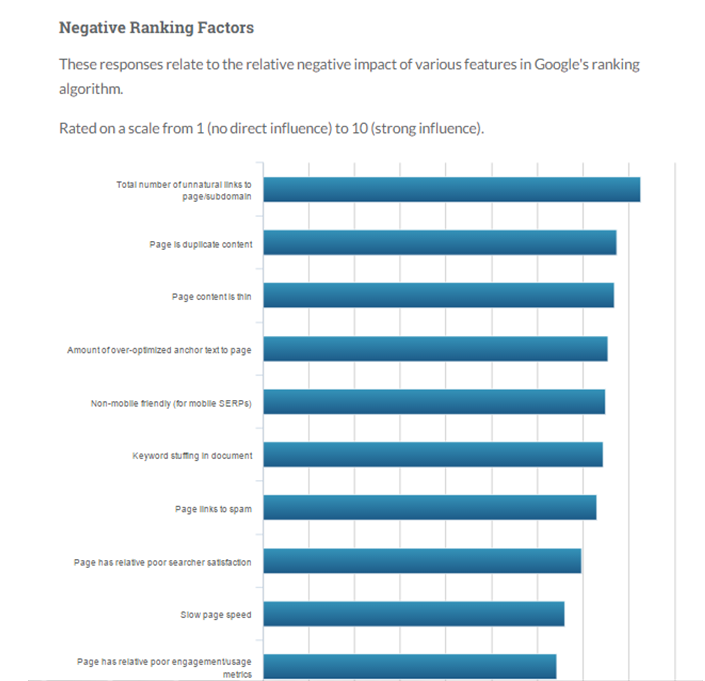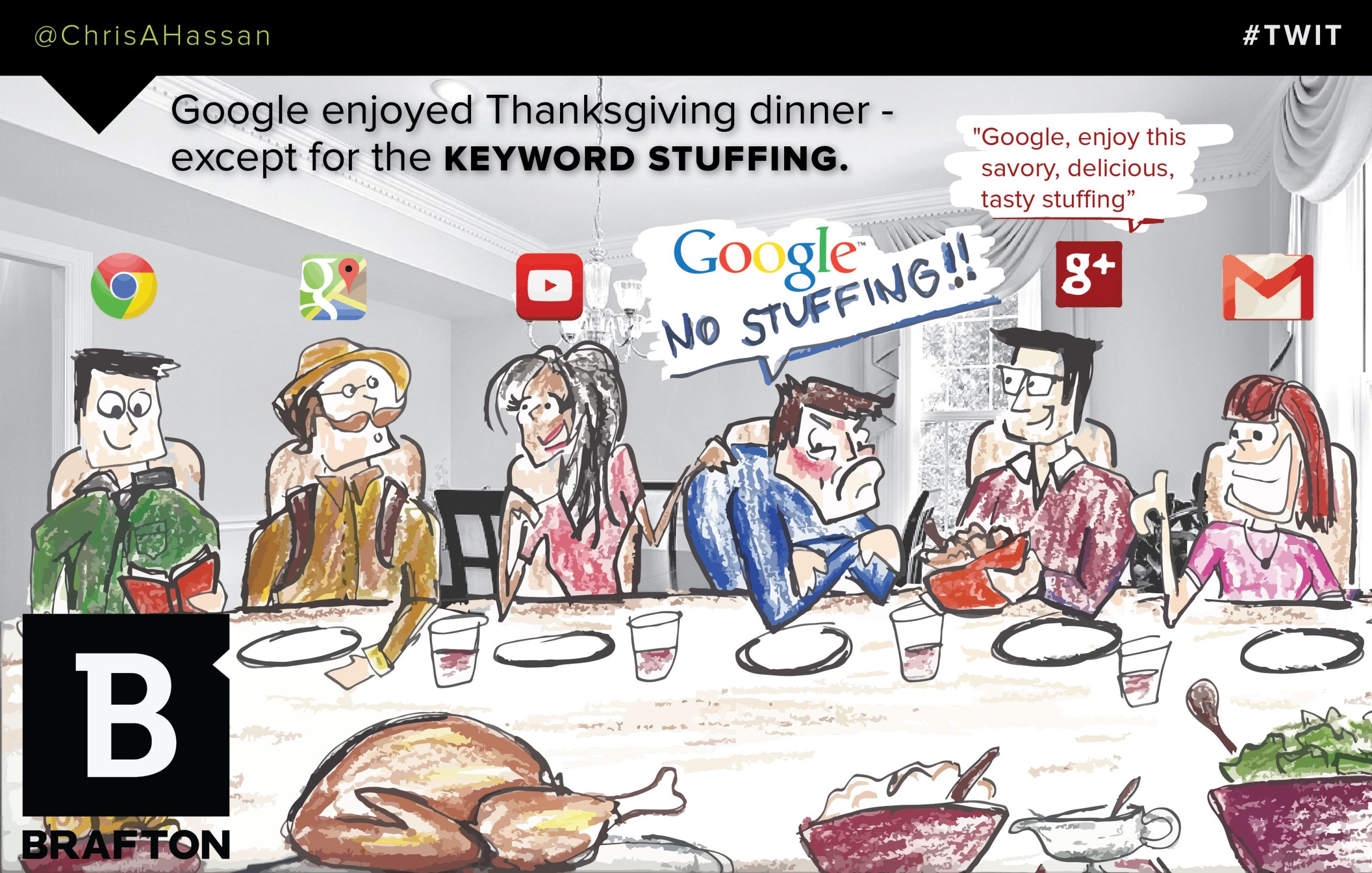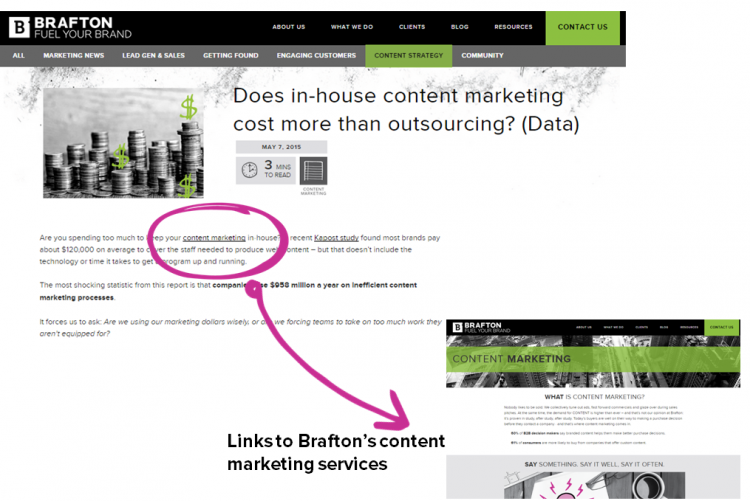Moz released it’s 2015 Search Engine Ranking Factors Study (the first since 2013) and it confirmed much of what we already knew: Links, keywords and content marketing still have the strongest correlation to high search rankings. The report drew on responses from over 150 marketing professionals who work in SEO to find out which practices move the needle for search results.
While some of the tried-and-true best practices continue to have an impact on websites’ success, there are a number of factors that have a negative effect on search visibility:

These results aren’t surprising. It shows that websites are seeing worse rankings for spammy practices that don’t provide better user experiences like:
1. Unnatural inbound links going to your page (AKA spam links)
If you’re buying links or participating in large-scale link schemes, you might be penalized with lower search results. Google even introduced the Penguin algorithm to make sure the pages at the top of search results are there because they have earned links from other authoritative sources.
2. Pages with duplicate content
Duplicate content is when you publish the same information on more than one page. Sometimes, it’s a mistake that happens during a website redesign when content is being migrated to a new domain. Other times, it’s a deliberate scheme to gain rankings for content you haven’t created yourself. No matter the case, it means searchers might run into the same answers in a results page when they click different links – making for a poor user experience.
- Deja duplicate content: Is Google sending a message?
- Some sites are exceptions to the SEO ‘no duplicate content’ rule
3. Thin content
Content is considered thin if it presents surface-level information that users can find on multiple sites across the web. It’s punishable because it doesn’t offer any unique value to readers. Instead, sites are rewarded with higher search rankings when they publish exclusive content users can’t find anywhere else on the web.
- Panda winners: news and blogs – Panda losers: thin content
- Content marketing is still the most effective (& challenging) SEO tactic
4. Over-optimized anchor text
Sites that create internal links to support their own keyword strategies might also see lower rankings. Anchor text refers to the linked copy someone clicks to see a new page. Overly optimized anchor text deliberately uses keywords in an attempt to pass link juice to that keyword; for instance: Cloud computing software vs. cloud computing.
5. Not being mobile friendly
There’s now more search traffic coming from mobile devices than desktops, and if your content isn’t optimized for mobile devices, your rankings are going to suffer. Earlier this year, Google launched a mobile algorithm to reward sites optimized for smartphones and tablets. Pages that aren’t optimized for mobile viewing may not show up at the top of mobile results because they are hard for searchers to navigate and use.
- Google updates search algorithms to be mobile-friendly, app relevant
- Mobile searches surpass desktop – what it means for your marketing
6. Keyword stuffing in documents
Some keyword use is rewarded, but too many keyword mentions correlate with lower rankings. Content sounds spammy when it contains multiple keyword mentions in close proximity. The old rule of thumb was to limit keyword use to one for every 100 words. Now, it’s best practice to use keywords only when they’re relevant and focus primarily on providing context.

7. Page links to spam
Content that links to spammy pages also tends to rank lower than it would in search. This might be a guilty-by-association scenario where Google penalizes sites for creating links to sites that don’t provide good answers to searchers.
- Google is closing in on black hat SEO practices
- When bad links happen to good content: SEO recovery tips
8. Site has poor user satisfaction metrics
Pages with poor user satisfaction metrics tend to rank lower in search results. For instance, a high bounce rate is a poor sign of user satisfaction because it means people who click through to the site immediately leave because it doesn’t have the information they want or it’s unattractive or looks untrustworthy.
9. Slow page speed
A long load time is correlated with lower search rankings. The longer it takes for content to load, the less likely people are to stick around to read it. Google doesn’t want to force users to wait for the information they’re searched for, thus prioritizing pages that load quickly.
10. Relative poor engagement metrics
Relative poor engagement metrics mean you get less engagement than other sites on the same results page. Low engagement metrics are a sign that visitors don’t find your content valuable. If people only stay on the page for a few seconds before leaving but remain on another site for much longer, it’s a sign that searchers might find other content more useful.
- How to tell if people are engaging with your content
- Content engagement increases 13% with a visual upgrade
Although this data shows correlating factors – not causational relationships – it suggests spammy practices are hurting sites’ search rankings. Companies won’t be rewarded with higher search positions when they employ SEO practices meant to game search engines. They need to optimize their sites for positive user experiences.
Here are three factors that positively impact search results:
1. Links
The number and relevance of links are cited as having the strongest influence over search rankings. Respondents listed the raw number of links from high-authority sites as the top factor that correlates with rank?, followed by the relevance of the pages that contain the links and then the domains in general (i.e. The links are more influential if the source of the link is relevant to the page it’s point to).
2. Content
Unique content is one of top factors that marketers perceive to have an influence on their search rankings. The pages must also be mobile-friendly and receive a relatively high click-through rate from search results pages compared with other results.
3. Keywords
Despite a lot of buzz about keywords becoming less important, most marketers say they’re still highly correlated with high search rankings. Some SEO practices, like using keywords in headlines and the body of content are perceived to have a strong influence, but so does context. Meanwhile, some practices that don’t have as strong correlation as they once did are using keywords in on-page links, bolding the terms or using them in image text.
The web isn’t the wild west anymore, and sites can’t game the system to get on Page One in search. To claim prime SERP real estate, you need to have web content that’s better than every other result out there. It needs to provide more information, be easier to understand and more enjoyable to read (or watch). Anything short of that will not attract the links or get the clicks that make sites stand out in results pages.






